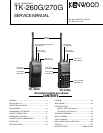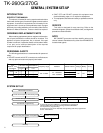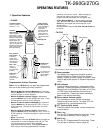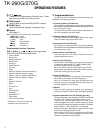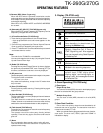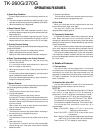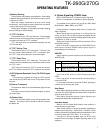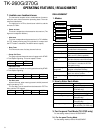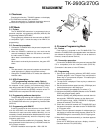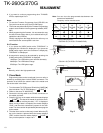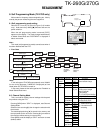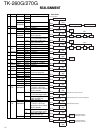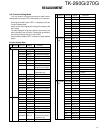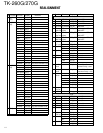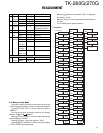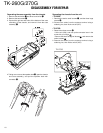TK-260G/270G
6
OPERATING FEATURES
6 Selected with talkback
The transceiver reverts to the channel before scanning or
the channel that you changed during scan.
8) Scan End
When you reactivate the key programmed to the scan
function during scan mode, scan ends.
The scan icon ("SCN") and "SCAN" or revert channel
(programmable) display goes off.
9) Temporarily Delete/Add
It is possible to delete or add a channel temporarily during
scan. When scan stops on an unnecessary channel, for
example by interference of the other party, press the delete/
add key, then that channel is deleted temporarily and scan will
re-start immediately.
When you would like to add a deleted channel temporarily
to the scan sequence, select the desired (deleted) channel
during scan, and press the delete/add key before scan re-starts.
That channel is added temporarily to the scan sequence.
The temporarily deleted or added channels are returned to
their pre-set delete/add conditions when the transceiver exits
from scan mode.
5. Details of Features
1) Time-out timer
The time-out timer can be programmed in 15 seconds
increments from 15 seconds to 300. If the transmitter is keyed
continuously for longer than the programmed time, the
transmitter is disabled and a warning tone sounds while the
PTT button is held down. The alert tone stops when the PTT
button is released.
2) Selective Call Alert LED
You can select whether or not the LED on the transceiver
flashes orange when selective call has occurred.
3) PTT ID
PTT ID provides a DTMF ANI to be sent with the PTT button
every time it is used (Begin of TX ID at beginning of
transmission, End of TX ID at end of transmission, or both).
You can program the PTT ID as one of the followings.
Off, BOT (Begin of TX ID), EOT (End of PTT ID), BOTH.
The contents of ID are programmed for each channel.
The transceiver is capable of having ID. The format is DTMF.
The timing that the transceiver sends the ID is
programmable.
Begin of TX ID (BOT) : Begin of TX ID is sent at the
beginning of transmission.
End of TX ID (EOT) : End of TX ID is sent at the end of
transmission.
Both : Begin of TX ID is sent at the beginning of transmission
and End of TX ID is sent at the end of transmission.
There is also a "PTT ID" setting for each channel.
3) Scan Stop Condition
The scan stops temporarily if the following conditions are
satisfied.
1 The receiving signal matches the signalling code in your
radio that is set by the programming software (KPG-56D).
2 When the Monitor key is depressed.
4) Scan Channel Types
1 Priority channel is the most important channel for scan,
and always detects a signal during scan and when the scan
stops temporarily.
2 Non-priority channels detect a signal during scan. For the
channels that can be selected with the group or channel
selector when the scan does not occur, the "A" icon lights.
5) Priority Channel Setting
A priority channel can be set as follows with the programming
software (KPG-56D).
1 Specify a priority channel as a fixed priority channel.
2 Make a selected channel a priority channel.
Specify the initial channel before the operator changes it.
6) Scan Type According to the Priority Channel
1 When no priority channel is set : Only the non-priority
channels are scanned.
If a non-priority channel stops temporarily, it stops until
there is no signal on the channel.
2 When priority channel is set : Either priority channel is
scanned.
If a non-priority channel stops temporarily, a priority channel
signal is detected at certain intervals.
If a priority channel stops temporarily, it stops until there is
no signal on the priority channel.
7) Revert Channel
The revert channel is used to transmit during scanning and
set by the programming software (KPG-56D).
1 Priority
The transceiver reverts to the priority channel.
2 Priority with talkback
The transceiver reverts to the priority channel.
If you press PTT during a resume timer (dropout delay time,
TX dwell time) or calling, you can transmit on the current
channel to answer to the call however revert channel is set
to priority channel.
After resume time, scan re-starts and the transmission
channel returns to the priority channel.
3 Selected channel
The transceiver reverts to the channel before scanning or
the channel that you changed during scan.
4 Last called channel
The transceiver reverts to the last called channel during
scan.
5 Last used channel
The transceiver reverts to the last used (transmitted)
channel during scan. "Last used" revert channel includes
talkback function.



